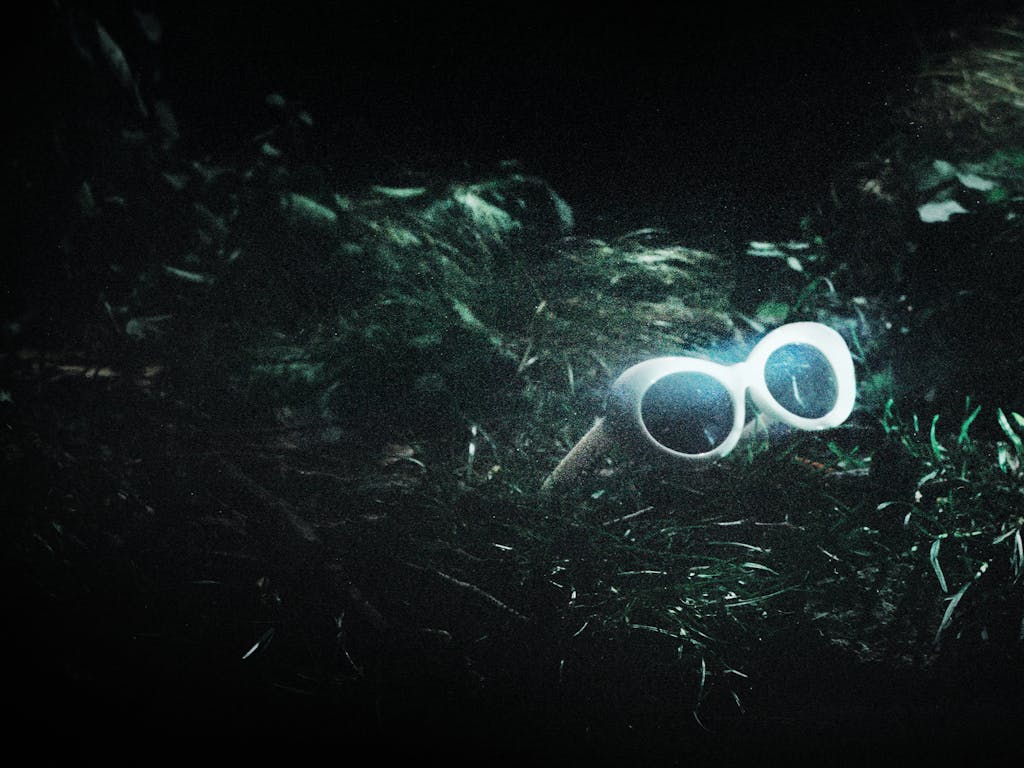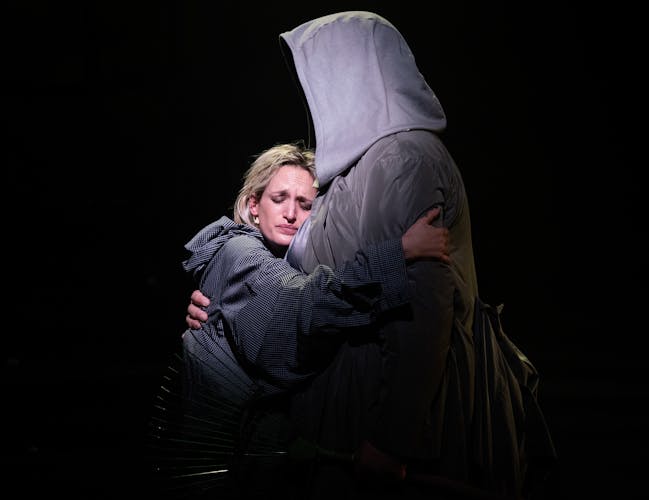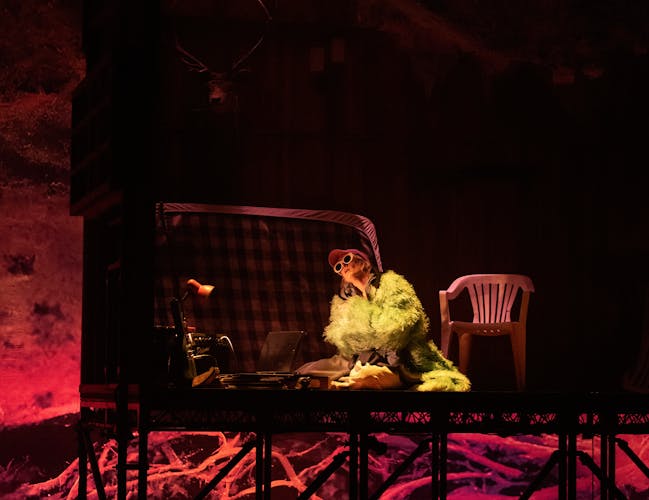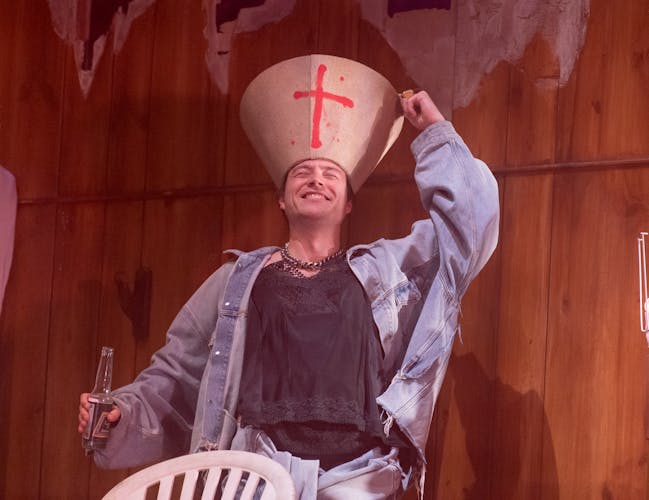Opera Essentials: Last Days
Our quick guide to Oliver Leith and Matt Copson’s visceral operatic adaptation of Last Days, the cult film by director Gus Van Sant.
Composer Oliver Leith and librettist/co-director Matt Copson’s Last Days had its world premiere at The Royal Opera in 2022. Adapted from American director Gus Van Sant’s 2005 film loosely based on the final days of grunge icon Kurt Cobain, the opera is an introspective exploration of alienation, banality and silence amidst noise, with costumes by Balenciaga and an original aria recorded by singer-songwriter Caroline Polacheck.
Quick Facts
What is Last Days about?
As its title suggests, Last Days follows the final and aimless days of a musician, Blake, who has recently escaped rehab to return home. Confronted by the banal events of life – an intrusive DHL delivery – and the more silent torments of fame – parasitic fans, persistent managers – the opera explores what it means to live, and then die.
Who directed the film Last Days?
American director Gus Van Sant (Elephant, Good Will Hunting, Milk) directed Last Days, which was released in 2005 by HBO films.
Is Last Days inspired by Kurt Cobain?
Gus Van Sant’s Last Days is a fictionalized account of the final days of Nirvana singer Kurt Cobain, who died by suicide at his home in Seattle, Washington. Though it takes its inspiration from the film, the opera is not about Kurt Cobain.
What is the music in Last Days like?
Oliver Leith’s dynamic score creates an immersive sound world where unconventional elements – whistles, rustling bin bags, glass bottles and the pouring of cereal create – blur together, obscuring the line between aural familiarity and unusual texture. The instrumentation, created for chamber ensemble, is minimalist and experimental, with the incorporation of these mundane, everyday sounds and a varied range of vocal techniques (spoken dialogue, pit-singing) all capturing Blake’s disintegrating reality.
Who designed the costumes for Last Days?
Fashion house Balenciaga designed the original costumes for Last Days. Under director Demna Gvasalia, the brand has been defined by deconstructed and oversized styles, streetwear, irony and a subversive post-modern direction, with recent brand ambassadors including Kim Kardashian, Nicole Kidman, Michelle Yeoh and Isabelle Huppert.
Gallery
Background
Gus Van Sant’s film Last Days (2005) is the third and final installment in the director’s ‘Death Trilogy’, which began with Gerry (2002), about two hikers – both named Gerry – who get lost in the desert, and continued with the Palme d’Or-winning Elephant (2003), about a high school shooting. Van Sant’s trilogy was a departure from his earlier commercially-successful films Drugstore Cowboy (1987), starring Matt Dillon, and Good Will Hunting (1997), starring Robin Williams and Matt Damon, as well as his indie cult classic My Own Private Idaho (1991), starring River Phoenix and Keanu Reeves. Like Gerry and Elephant, which draw inspiration from real-life events (the former a news story, the latter, the Columbine shooting), Last Days is loosely based on the final, unaccounted-for days of Nirvana frontman Kurt Cobain, who died by suicide at his home in Seattle, Washington in 1994.
Though Van Sant originally sought to do a biographical film on Cobain, whose band Nirvana not only popularized alternative rock but skyrocketed the singer to international stardom, he later changed direction opting for a more abstract depiction. Taking inspiration from the art house films of Chantal Akerman and Béla Tarr, Van Sant has likened Last Days to slow cinema, with its nearly real-time events and lack of plot and dialogue. For much of the film, the character of Blake (Michael Pitt), reminiscent of Cobain, inaudibly and incoherently mumbles. This style of speech – or non-speech – is maintained in Oliver Leith and Matt Copson’s adaptation, with their Blake, French actor Agathe Rousselle (of Julia Ducournau’s Titane), doing the same. For more on the making of Last Days, including the director’s encounter with Cobain, read our interview with Vant Sant.
Leith and Copson’s idea for an operatic adaptation of the film came about pre-pandemic. ‘We had talked about Last Days as a reference for this sort of everyday lull,’ says Leith. ‘Everything in the film is heightened, no matter how mundane it is, because we know that Blake will kill himself. After a long time, climbing the walls to find an analogy for it, we knew that we needed to adapt the film.’
Assembling a dynamic team, including set designer Grace Smart, Balenciaga for costumes and co-director Anna Morrissey, Copson and Leith crafted what would become a critically-acclaimed work, with sell-out successes in Covent Garden, as well as at the opera’s US premiere at the Los Angeles Philharmonic, conducted by Thomas Adès. Smart’s set designs blur the lines between chaos and isolation, her depiction of a cluttered environment, including a television set with a plaid backdrop, a kitchen area with cereal boxes, and a shotgun prominently displayed, setting the scene for Blake’s final days, while the oversized, deconstructed, sculptural designs by Balenciaga communicate eccentricity and alienation.
Music
Composer Oliver Leith has long been associated with experimental sound, his work described as ‘deadpan, subversive, quietly anarchic, disarmingly heart-sore and sweet-sour’ (BBC Radio 3). In Last Days, his score highlights found sound, with the everyday noises of cereal falling into a bowl and bin bags containing empty bottles blurring together with subtle shifts in instrumentation and vocalization. The result, supported by the sound design of Sound Intermedia, is a hypnotic sonic landscape of familiarity and novelty, where emotional resonances are all the more tangible.
For Last Days, Leith also wrote a soaring original aria for singer-songwriter Caroline Polacheck, ‘Non voglio mai Vedere il solo tramontare’. Says Polacheck: ‘Sometimes time is expensive; sometimes time is cheap. We stylise its fluctuations in art. Once, I heard someone say that you should never write a song that you wouldn’t sing to someone on their deathbed. That’s bullshit. They say there’s a time for everything, but sometimes there just isn’t enough time. Before Oliver Leith composed ‘Non voglio mai Vedere il solo tramontare’ for me, he asked me what the highest note I can sing is. Even when I hold a high F#, my skull resonating past the point of cogent thought, my breath is finite, it cannot be sustained. We all know how it ends, we just don’t know when’.
Though there is an influence of Cobain on Last Days, Leith, though a fan of Nirvana, says that ‘There’s no real attempt to engage with grunge in the music, apart from a small bit where Blake plays guitar.’ ‘I wouldn’t touch that music,’ he continues: ‘I love it too much.’ Still, he adds, ‘I guess grunge might be there in the character of the opera: the language is not florid and delivered in smudged lines and mumbles’. For more on his composition of Last Days, read our interview with Oliver Leith.
Character list
Blake – a rock musician who has escaped rehab to return home
Housemates – Blake’s scrounging friends who, like him, aimlessly wander
Delivery Driver – A DHL driver representing the banality of life
Mormons – missionaries who knock on Blake’s door
Groundskeeper – an ominous figure lurking around the house
Private Investigator – a man hired to track Blake’s whereabouts
Synopsis
Blake, a successful musician, has recently escaped rehab to return home. The safety of his house is soon disrupted by a slew of unwelcome guests – an insistent delivery worker, a pair of Mormons on a mission, a chorus of scrounging friends and the ominous figure of the property’s groundskeeper. Matters are made worse by the never-ending phone calls from his Manager and presence of a Private Investigator and Superfan stalking nearby. Blake responds by hiding and disassociating from his surroundings. As the chaos around him reaches an apex, a ghostly apparition of a magician appears before Blake, offering him a way out – in the form of a bullet. Blake is left alone – at last – with nothing to confront but himself. Realising he is existentially trapped, he chooses to end it all, and with his death the last days are over.
Watch More
- Linbury Theatre
Last Days
- Opera and Music
Outside noise. Inside turmoil.




